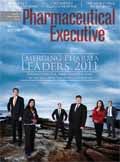Branding a Unique Story
Pharma company communicators must steer the conversation about vaccines to the ultimate goal-preventing disease
First in market
With vaccines come questions, heated debate, and controversy. Pharmaceutical company communicators must return the conversation to the ultimate goal— preventing disease.

Nick Colucci, CEO & President | Publicis Healthcare Communications Group
Gardasil entered the pharmaceutical market with welcomed anticipation—and it wasn't just because it was introduced as the world's first cervical cancer vaccine or because of its controversial nature. It was because the market saw a social/medical need.
Tobacco use is a serious public health threat. It is the single leading preventable cause of death in the United States and responsible for more than 440,000 deaths every year. According to the Centers for Disease Control and Prevention (CDC), approximately 45.8 million US adults and 3.1 million high school students smoke, triggering some $75.5 billion in excess medical costs and another $81.9 billion in mortality-related productivity losses annually. Despite widespread knowledge of tobacco's dangerous health impact, many smokers are unable to quit, due to tobacco's addictive nature.
The alarming gap in awareness is an opportunity for the industry to show leadership. The societal call-to-action requires getting the message out early to everyone charged with making a difference—hitting exactly the right chords with physicians, caregivers, and patients.
Unbranded campaigns do society's essential health education heavy lifting. They set the tone for family kitchen-table discussion. Like the Viagra-effect, making it acceptable to discuss erectile dysfunction with your partner or your physician, disease-oriented, non-branded public campaigns make people think and talk. The Viagra-effect also brought patients into the physician's office, prompting identification of heart disease and diabetes, among other diseases.
We as an industry must speak to indisputable and widespread health urgencies. The benefit of knowing that young people might be protected from tobacco addiction is life-saving. The reality is that there are health concerns we need to take on—despite the controversy—and pharma is using unbranded campaigns as a path toward unlocking inhibitions around sensitive health issues. Ultimately, that will translate into doing good and good business.
First in class
Oftentimes, marketing a first-in-class drug also means raising awareness about a growing or little-recognized disease. Even after navigating regulatory hurdles, makers of innovator therapies must educate patients, physicians, and payers on the merits of their drug, and, as is often left to pioneers, create new understanding.
Before Viagra came along, the world had never heard of erectile dysfunction. Heavy advertising and other promotions by Pfizer made Viagra a household name.
First-in-class drugs may not ultimately be the best in class. Market share can easily be lost due to innovation. With the incredible pace of scientific research, each passing day leads to better understanding of a drug target—knowledge that may benefit the follow-on drug maker. To compete in the long term, companies must differentiate products.
In the incredibly competitive autoimmune market, advertising and branding trends are driven by benefits. Although physicians and patients are always looking for new treatments, they remain reluctant to switch from therapies that show good results without solid proof that a newer biologic will improve care. For example, a novel, first-in-class biologic for Chrohn's disease with solid data had a slow uptake because side effects seemed worrisome. Gastroenterologists chose to exhaust use of existing anti-TNF therapies before trying a newer option.
Sometimes great scientific studies or even superior dosing regimens aren't enough to grab people's attention. You have to connect with your audience, listen to their concerns, and together conquer a disease impacting patients' lives. To set autoimmune brands apart, advertising agencies need to mine a brand's unique story, which too often is buried beneath complex data. Strong data are the essential reason therapies reach market. However, clarity of communications sets them apart. In addition, we need to uncover the real needs of the patient, looking at them as a human being first.
One of our roles as communications and creative experts is to communicate those unique brand differentiators in a relevant manner in order to connect and engage. Good data are a must—conveying patient value is the differentiator, and understanding creates societal benefit.

The Misinformation Maze: Navigating Public Health in the Digital Age
March 11th 2025Jennifer Butler, chief commercial officer of Pleio, discusses misinformation's threat to public health, where patients are turning for trustworthy health information, the industry's pivot to peer-to-patient strategies to educate patients, and more.
Navigating Distrust: Pharma in the Age of Social Media
February 18th 2025Ian Baer, Founder and CEO of Sooth, discusses how the growing distrust in social media will impact industry marketing strategies and the relationships between pharmaceutical companies and the patients they aim to serve. He also explains dark social, how to combat misinformation, closing the trust gap, and more.